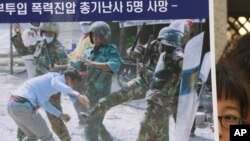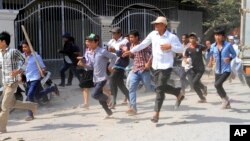Major international clothing companies say they are concerned for the safety of Cambodia’s garment workers and want to see peaceful negotiations between unions, factories and the government.
The workers have been on strike for weeks, calling for the monthly minimum wage to be doubled to $160. The industry employs up to 400,000 people.
Five people were killed, 40 injured and 23 arrested in crackdowns on striking workers and other demonstrators last week. Many laborers have since returned to work but unions are still calling for a raise.
In an unusual move, major international clothing retailers, including H&M, Adidas, Gap, Columbia, Puma and Levi Strauss, this week signed a joint letter decrying violence against workers.
“We strongly oppose any form of violence, and urge the Royal Government of Cambodia to drive negotiations among stakeholders to peacefully resolve this dispute,” Laura Wilkinson, a spokeswoman for Gap, told VOA Khmer in an e-mail.
Ron Parham, a spokesman for Columbia, said the company was “deeply troubled” by recent events. Columbia has urged the government and its labor advisory committee to set a minimum wage based on “international good practices.”
“We believe that every worker has the right to work in a safe and secure environment and to associate, organize and bargain collectively in a lawful and peaceful manner without penalty, interference or fear,” he said in an e-mail. “This includes the right to negotiate a raise in the minimum wage.”
However, the companies VOA Khmer contacted said they did not plan to stop buying goods from Cambodia if the minimum wage is not raised or violence against workers continues.
“H&M remains committed to Cambodia as one of our key sourcing countries,” said Anna Eriksson, a spokeswoman for the company. “As a key buyer in [the] Cambodian garment industry, we will continue to encourage all relevant parties to renew negotiations and to come to a mutually agreeable solution to this conflict.”
Representatives for sportswear companies Adidas and Puma said they stood by the contents of a Jan. 7 open letter to the government, unions and manufacturers, urging peaceful negotiations and restraint.
Cambodia exports about $5 billion in garments and shoes annually, but workers say they cannot live on the current minimum wage of $80 a month.
The Garment Manufacturers Association in Cambodia, which represents factories, originally said a wage increase was not possible and that factories would move to other countries if workers continued to strike.
But in a conciliatory gesture, Ken Loo, secretary-general of the association, said recently that factories would abide by a wage increase if the government puts it in place.
No new date for negotiations has been set. On Friday, Labor Secretary Oum Mean told VOA Khmer he was “busy” and could not discuss the issue.
In South Korea, Cambodian workers in South Korea this week held their own demonstrations in solidarity with the garment workers at home, calling on the Phnom Penh government to investigate last week’s shootings and hold accountable those responsible.
The workers have been on strike for weeks, calling for the monthly minimum wage to be doubled to $160. The industry employs up to 400,000 people.
Five people were killed, 40 injured and 23 arrested in crackdowns on striking workers and other demonstrators last week. Many laborers have since returned to work but unions are still calling for a raise.
In an unusual move, major international clothing retailers, including H&M, Adidas, Gap, Columbia, Puma and Levi Strauss, this week signed a joint letter decrying violence against workers.
“We strongly oppose any form of violence, and urge the Royal Government of Cambodia to drive negotiations among stakeholders to peacefully resolve this dispute,” Laura Wilkinson, a spokeswoman for Gap, told VOA Khmer in an e-mail.
Ron Parham, a spokesman for Columbia, said the company was “deeply troubled” by recent events. Columbia has urged the government and its labor advisory committee to set a minimum wage based on “international good practices.”
“We believe that every worker has the right to work in a safe and secure environment and to associate, organize and bargain collectively in a lawful and peaceful manner without penalty, interference or fear,” he said in an e-mail. “This includes the right to negotiate a raise in the minimum wage.”
However, the companies VOA Khmer contacted said they did not plan to stop buying goods from Cambodia if the minimum wage is not raised or violence against workers continues.
“H&M remains committed to Cambodia as one of our key sourcing countries,” said Anna Eriksson, a spokeswoman for the company. “As a key buyer in [the] Cambodian garment industry, we will continue to encourage all relevant parties to renew negotiations and to come to a mutually agreeable solution to this conflict.”
Representatives for sportswear companies Adidas and Puma said they stood by the contents of a Jan. 7 open letter to the government, unions and manufacturers, urging peaceful negotiations and restraint.
Cambodia exports about $5 billion in garments and shoes annually, but workers say they cannot live on the current minimum wage of $80 a month.
The Garment Manufacturers Association in Cambodia, which represents factories, originally said a wage increase was not possible and that factories would move to other countries if workers continued to strike.
But in a conciliatory gesture, Ken Loo, secretary-general of the association, said recently that factories would abide by a wage increase if the government puts it in place.
No new date for negotiations has been set. On Friday, Labor Secretary Oum Mean told VOA Khmer he was “busy” and could not discuss the issue.
In South Korea, Cambodian workers in South Korea this week held their own demonstrations in solidarity with the garment workers at home, calling on the Phnom Penh government to investigate last week’s shootings and hold accountable those responsible.












